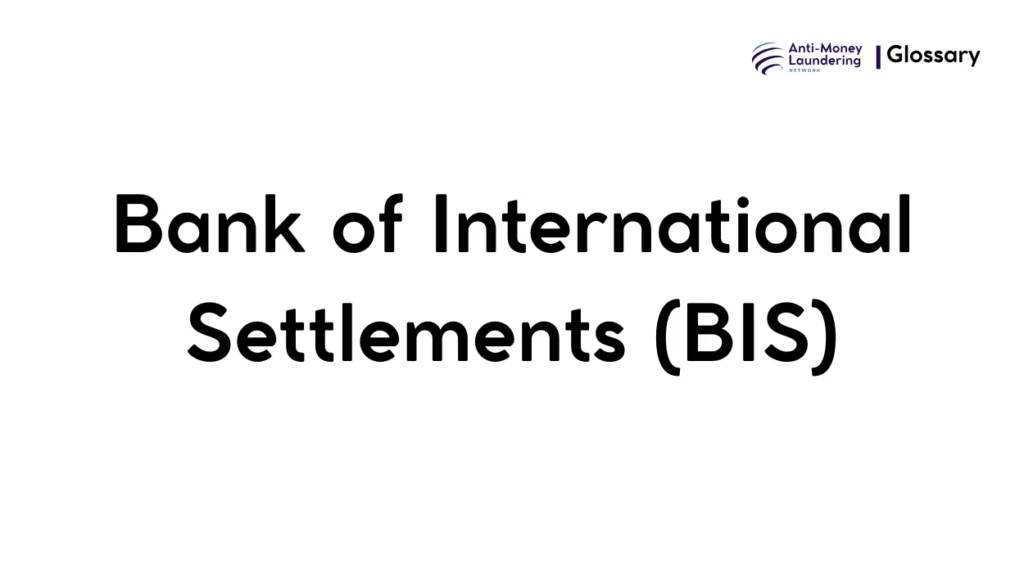Definition
The Bank of International Settlements (BIS) is an international financial organization owned by 60 central banks representing countries responsible for about 95% of the world’s GDP. In the context of Anti-Money Laundering (AML), BIS plays a pivotal role by providing a platform for central banks and financial authorities to collaborate, develop standards, share information, conduct research, and promote financial stability. Specifically, BIS supports AML efforts by issuing guidelines, analyses, and frameworks that help institutions detect, prevent, and combat money laundering and related financial crimes globally.
Purpose and Regulatory Basis
BIS’s primary mission is to serve central banks in maintaining monetary and financial stability worldwide through cooperation and by acting as a bank for central banks. Its AML role is embedded within this broader mandate of safeguarding the integrity and stability of the global financial system. BIS contributes to the regulatory framework by aligning with major international AML standards and initiatives such as the Financial Action Task Force (FATF), the USA PATRIOT Act, and the European Union’s Anti-Money Laundering Directives (AMLD).
The BIS guidelines provide a comprehensive framework for robust AML risk management, assisting financial institutions in developing effective monitoring systems and ensuring compliance with capital adequacy and cybersecurity standards. This framework influences national regulations and supervisory practices, helping countries implement FATF recommendations and other AML legalities.
When and How it Applies
BIS’s AML standards and research apply in diverse real-world contexts where financial institutions and central banks actively monitor and mitigate money laundering risks. For example, banks use BIS guidance to enhance their customer due diligence, transaction monitoring, and risk assessment protocols. BIS’s research on technologies such as network analysis and machine learning improves detection of suspicious activities in national and cross-border transactions.
A contemporary application is BIS’s proposal of an AML compliance scoring system for cryptocurrencies, aimed at identifying illicit digital assets based on their transaction histories, which can be used by exchanges and regulators to prevent laundering via crypto channels.
Types or Variants
While the BIS itself is a singular institution, it issues multiple types of AML-related guidelines and frameworks:
- AML risk management and compliance frameworks.
- Cybersecurity and data protection standards to safeguard financial data.
- Capital adequacy requirements linked to AML risk exposure.
- Innovative technological approaches, such as AI and network-based machine learning for AML monitoring.
- Emerging financial area guidelines, including those for cryptocurrencies.
Procedures and Implementation
Financial institutions complying with BIS AML standards typically follow these steps:
- Conduct comprehensive AML risk assessments covering customers, products, services, and geographies.
- Develop internal policies and procedures aligned with BIS and international AML frameworks.
- Implement customer due diligence (CDD) including Know Your Customer (KYC) verifications.
- Employ advanced monitoring systems, sometimes incorporating network analysis and machine learning, to detect suspicious transactions.
- Conduct regular training and appoint dedicated AML compliance officers.
- Perform ongoing transaction monitoring and periodic risk reassessments.
- Report suspicious activities to relevant authorities following established regulatory channels.
- Undergo audits and independent reviews to ensure compliance with regulatory and BIS standards.
Impact on Customers/Clients
From the customer’s perspective, adherence to BIS-influenced AML policies means stricter verification and monitoring procedures. Customers may be required to provide detailed personal and financial information during onboarding and throughout their relationship with financial institutions. High-risk customers may face enhanced scrutiny, and transactions suspected of illicit activity can be blocked or reported. While these measures might cause delays or additional steps, they protect customers by ensuring the safety and integrity of the financial system.
Duration, Review, and Resolution
AML compliance under BIS frameworks is an ongoing commitment. Institutions are expected to continuously update their risk assessments, policies, and monitoring processes according to new threats and regulatory changes. Regular reviews—often annually—are mandated, with senior management responsible for oversight. Resolution of detected suspicious activity involves investigations and, if required, reporting to authorities, alongside updating controls to prevent recurrence.
Reporting and Compliance Duties
Institutions must document all AML activities and maintain records as defined by BIS standards and local laws. They have reporting obligations to notify regulatory bodies of suspicious transactions or breaches. Non-compliance can result in severe penalties, including fines, sanctions, and reputational damage. BIS guidelines emphasize transparent reporting and active collaboration with national and international AML bodies.
Related AML Terms
BIS AML activities intersect with several other AML concepts including:
- Customer Due Diligence (CDD)
- Know Your Customer (KYC)
- Suspicious Activity Reporting (SAR)
- Money Laundering Typologies
- Countering the Financing of Terrorism (CFT)
- AML compliance programs and controls
Challenges and Best Practices
Challenges include keeping up with evolving money laundering techniques, managing false positives in transaction monitoring, and balancing privacy with regulatory demands. Best practices encouraged by BIS include adopting risk-based approaches, utilizing technological innovations such as machine learning, fostering international cooperation, and maintaining robust training and internal audit systems.
Recent Developments
BIS continues advancing AML compliance by integrating AI and network analysis to enhance monitoring efficiency and accuracy. The proposal for AML compliance scoring in the cryptocurrency sector marks a significant regulatory innovation addressing emerging risks in digital assets. Additionally, BIS emphasizes the need for continuous adaptation to changing financial environments, including fintech and cross-border payment complexities.
The Bank of International Settlements (BIS) plays a critical role in global AML efforts by providing central banks and financial institutions with frameworks, guidelines, and research to develop effective AML controls. Its work supports international cooperation, innovations in AML technology, and compliance with global standards, ensuring the stability and integrity of the global financial system. For compliance officers and financial institutions, understanding and implementing BIS AML recommendations remains essential to managing risks of money laundering and fulfilling regulatory obligations.

